1 Introduction
Jews were proud of their ancestry
- descendants of Abraham
- better than others
- assurance of eternal life


Conversion to Judaism Mandatory
- shared salvation only to Jewish proselytes
- circumcision and the Law of Moses
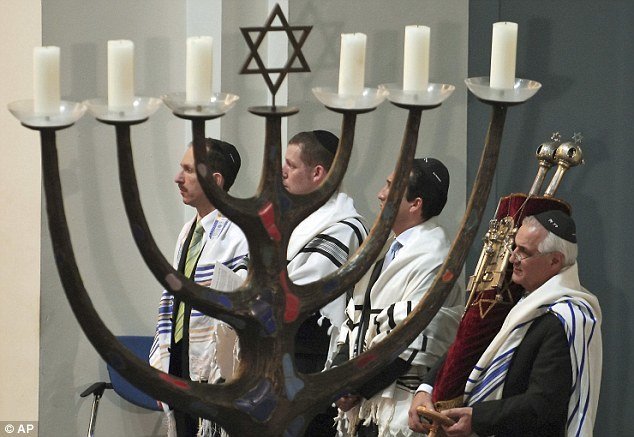
They reject Christianity
- cannot go to the Jews
- wanted ownership and control

Paul's letters
- refutes Judaisers
- ALL fall short of the glory of God
- false sense of pride and security
- Rom 4 - Abraham

Who is Abraham?
- 230 verses in the Bible
- Genesis 11-25, biographical incidents
- 135 verses point back to these historical events

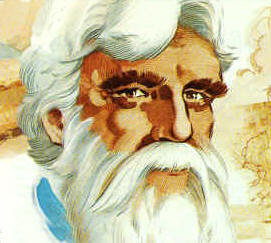
Origins
- first Abram
- the land of Ur of the Chaldeans (Gen 11:28)
- Terah, Abram's father, settled in Haran
- God instructs Abram to leave Haran and go to another place
- God promises to make him a great nation
- the world will be blessed through his seed
- Abram obeyed and took Lot, his nephew

Story
- famine in Canaan took him to Egypt
- fearing being killed, lies to Pharoah
- passes off Sarai as his sister
- put at risk the promised "seed"
- God prevents the marriage consummation
- Pharoah rebukes Abram and escorts him to Canaan
- story repeats with Abimelech (Gen 20)

Abram and Lot
- they were separated
- Lot taken captive and Abram rescues him
- Abram offers a tithe to Melchizedek
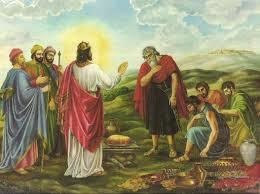
The promise reaffirmed
- the covenant reaffirmed
- a son is promised
- Abraham believes
- his faith is reckoned as righteousness
- 400 years of mistreatment in a foreign land
- then they would possess the land of Canaan

Abram and Sarai
- still no son
- Hagar is given
- at 86, Ishmael is born
- not the son of promise

The promised seed
- at 99, the covenant reaffirmed
- Abram to Abraham, Sarai to Sarah
- all males to be circumcised
- sign of the covenant
- years after being declared righteous on the basis of faith
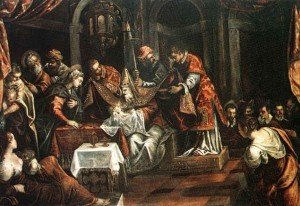
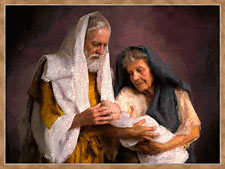
Sodom and Gomorrah
- God reveals his plan
- Abraham pleads for these cities

Isaac is born
- called to sacrifice his son
- test of his trust in God
- God is the One able to give life to the dead
- no more need to lie or to be afraid

End of Story
- Sarah dies at 127
- Abraham lives for another 38 years
- marries again and has more children
- buries Sarah in Canaan, later used for the entire family
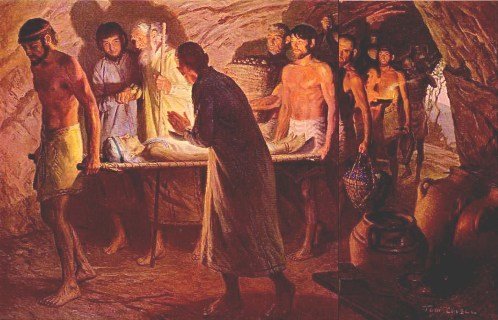
Isaac
- wanted a right wife for his son
- she was not to be a Canaanite
- Rebekah, daughter of Bethuel, a relative
- Abraham dies at 175
- 100 years with God
- 1/4th spent in waiting for God's promise
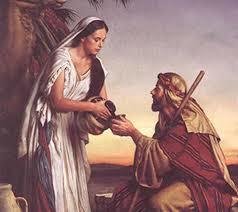
OT References
- Psalm 105:4-15
- Isaiah 51:1-8
- Jeremiah 23:19-26
- Ezekiel 33:23-39
- Micah 7:14-20


NT References
- in Gospels, show the distorted thinking of the Jews
- John the Baptist (Mt 3:7-12)
- Jesus rocked the boat of Jewish exclusivism
- Mt 8:10-12
- Lk 16:22-31
- Jn 8:31-59 (esp 58)
- Jesus as God's only provision for entering heaven
- Gal 3:15-16
- "seed" is singular
- one Person–Jesus
- Abraham is the father of all who believe in God
2 Study
Romans 3:27-31
27 Where, then, is boasting? It is excluded! By what principle? Of works? No, but by the principle of faith! 28 For we consider that a person is declared righteous by faith apart from the works of the law. 29 Or is God the God of the Jews only? Is he not the God of the Gentiles too? Yes, of the Gentiles too! 30 Since God is one, he will justify the circumcised by faith and the uncircumcised through faith. 31 Do we then nullify the law through faith? Absolutely not! Instead we uphold the law.
Romans 4:1-8
What then shall we say that Abraham, our ancestor according to the flesh, has discovered regarding this matter? 2 For if Abraham was declared righteous by works, he has something to boast about–but not before God. 3 For what does the scripture say? "Abraham believed God, and it was credited to him as righteousness." 4 Now to the one who works, his pay is not credited due to grace but due to obligation. 5 But to the one who does not work, but believes in the one who declares the ungodly righteous, his faith is credited as righteousness.
6 So even David himself speaks regarding the blessedness of the man to whom God credits righteousness apart from works:
7 "Blessed are those whose lawless deeds are forgiven, and whose sins are covered; 8 blessed is the one against whom the Lord will never count sin."
Romans 4:9-12
Is this blessedness then for the circumcision or also for the uncircumcision? For we say, "faith was credited to Abraham as righteousness." 10 How then was it credited to him? Was he circumcised at the time, or not? No, he was not circumcised but uncircumcised! 11 And he received the sign of circumcision as a seal of the righteousness that he had by faith while he was still uncircumcised, so that he would become the father of all those who believe but have never been circumcised, that they too could have righteousness credited to them. 12 And he is also the father of the circumcised, who are not only circumcised, but who also walk in the footsteps of the faith that our father Abraham possessed when he was still uncircumcised.
Romans 4:13-17
For the promise to Abraham or to his descendants that he would inherit the world was not fulfilled through the law, but through the righteousness that comes by faith. 14 For if they become heirs by the law, faith is empty and the promise is nullified. 15 For the law brings wrath, because where there is no law there is no transgression either. 16 For this reason it is by faith so that it may be by grace, with the result that the promise may be certain to all the descendants–not only to those who are under the law, but also to those who have the faith of Abraham, who is the father of us all 17 (as it is written, "I have made you the father of many nations"). He is our father in the presence of God whom he believed–the God who makes the dead alive and summons the things that do not yet exist as though they already do.
Romans 4:18-22
18 Against hope Abraham believed in hope with the result that he became the father of many nations according to the pronouncement, "so will your descendants be." 19 Without being weak in faith, he considered his own body as dead (because he was about one hundred years old) and the deadness of Sarah's womb. 20 He did not waver in unbelief about the promise of God but was strengthened in faith, giving glory to God. 21 He was fully convinced that what God promised he was also able to do. 22 So indeed it was credited to Abraham as righteousness.
Romans 4:23-25
23 But the statement it was credited to him was not written only for Abraham's sake, 24 but also for our sake, to whom it will be credited, those who believe in the one who raised Jesus our Lord from the dead. 25 He was given over because of our transgressions and was raised for the sake of our justification.
Structure
Three questions
- (3:27-28) Where is boasting?
- (3:29-30) Is God only of the Jews?
- (3:31) Is the Law nullified by salvation by faith?
Abraham
- (4:1-8) Abraham's justification by faith alone
- (4:9-17) Abraham's justification by faith as a Gentile
- (4:17-25) Abraham's resurrection faith is required today
3 Three Questions
Implications
- All of humanity has failed to meet God's standards
- Jews and Gentiles are under God's wrath
- In His righteousness, God condemns the sins of all
- In His righteousness, God has made a provision for our justification
- Punished Jesus in our place on the cross
- Thus we are justified, saved by grace

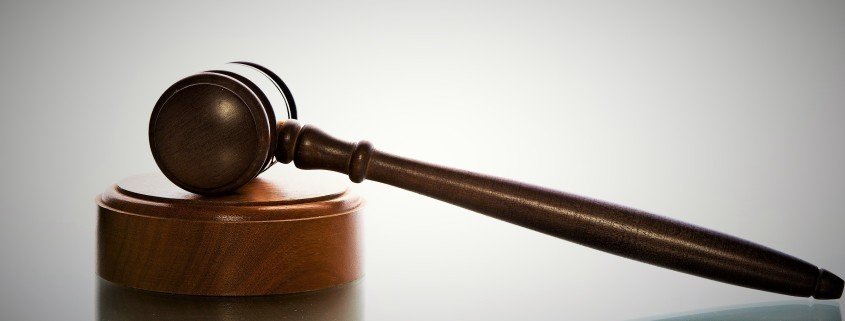
This section
- asks three questions
- answers them briefly
- answer has to be clear to his reader
- then gives a more extensive explanation
- Romans 4 directly answers the first 2 questions
- Romans 6-8 expand on the role of the Law in the life of the believer
First question
- "What basis does anyone have for boasting concerning salvation?"
- No basis
- Cannot boast for something they did not earn
- Saved by faith, on the basis of what God has done
- someone boasting may not be saved

Second question
- "Are God's dealings with humans universal, or are they restricted to Jews only?"
- Does God care only for the Jews?
- Gentiles do not seem to exist
- Paul affirms that "God…is one"
- Jewishness is irrelevant to salvation
- only determining factor is the presence of faith

Third question
- "Is the Law of no use, now that faith has come?"
- Abraham's faith was before the Law
- Others, like David, faith was evident in their love for the Law
- the Law was never meant to save
- Jesus came not to destroy the Law but to fulfill it
- Righteousness delights in the Law

4 Justification by Faith
Abraham's boasting
- Jews boasted about Abraham
- What if Abraham himself could not boast?
- Performance is the only basis for boasting
- Abraham's righteousness was not rooted in his works
- Justified by faith, gift from God

Moses says
- "And Abraham believed God, and it was reckoned to him as righteousness." Gen 15:6
- basis was faith in God
- Abraham could only boast in God
- his faith was a favour from God, not payment

Abraham's faith
- Abraham's faith did not save him
- it too was fragile and frail
- God saved him by means of faith
- To the Jews, Abraham was the star
- To Paul, God needs to be the centre
- Not the greatness of Abraham's faith
- the greatness of the God in whom he trusted

God justified Abraham
- "impute"
- "reckoned" (3,4,5,6,8,9,10,11,22,23,24)
- To relate to a particular cause or source; place the fault or responsibility for: imputed the rocket failure to a faulty gasket; kindly imputed my clumsiness to inexperience.
- To assign as a characteristic; the gracefulness so often imputed to cats.
- the reckoning process is essential to our salvation
- enables God to deal with us in a way that saves us
- and demonstrates his righteousness
First, God imputes the righteousness
of Christ to people
- we cannot attain God's standard of righteousness
- never become righteous by good works
- it has to come from another source
- Paul cites Gen 15:6
- God reckoned Abraham to be righteous
- stresses in vv. 4 and 5 that this was not earned
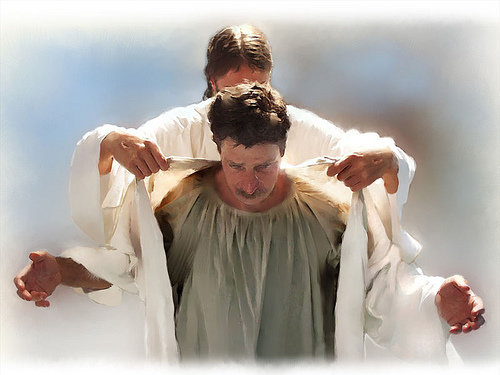
Second, God does not impute their sins to them
- God does not impute the sins of unrighteous people to them
- Christ has taken our place
- our sins have been imputed to him
- He was punished in our place
- his righteousness has been imputed to us
- we are regarded and treated as righteous by God
- this is because by faith we are in Him
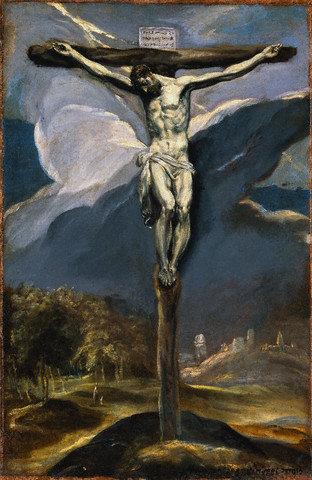
OT illustrations
- Abraham reckoned as righteous by God for his faith
- David's sin was not imputed to him
- Ps 32, a psalm of confession
- adultery with Bathsheba
- murder of Uriah
- the Law pronounced David guilty
- but could not save him
- David knew the grace of God
- he pleads for forgiveness and receives it

5 Abraham, the Father of Us All (4:9-17)
Second question
- Is God only the God of the Jews?
- Paul's opponents would concede first answer
- But they saw themselves as privileged
- Gentiles should convert to Judaism (Acts 15)

Abraham, the Gentile
- justified without the Law
- years before he was circumcised (Gen 17)
- Gentile when he was saved (Gen 15:6)
- Circumcision did not contribute to Abraham's salvation
- Merely a sign or seal
- Applies to Gentiles today
- father of ALL believers
- v. 17 cites Gen 17:5, "Father of many nations"

6 Abraham's Resurrection Faith
Transition verse
- v 17 links 9-16 and 18-25
Resurrection
- his faith was in a God who was able to raise the dead
- problem for the Sadducees, the rationalists
- did not accept Jesus' resurrection
- Mt 12:38-41, Jn 10:15-18
- Acts 2:22-42; 3:14-15; 4:2; 17:18; Rom 10:9
- Heb 11:13-40 (13-15, 19, 35, 39-40)

God gives life to the dead
- v 17
- Abraham and Sarah were as good as dead (19)
- God's promises are as certain as God's power
- v 21, "what he promised He was able to perform"
- hence righteousness was imputed to him

The faith of every true believer
- Paul shows the absolute necessity of the resurrection of Jesus
- we as sinners need to believe this
- Christ sacrifice was for our sins
- our justification requires his resurrection (4:25)
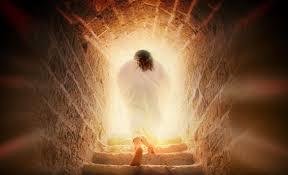
7 Conclusion
Summary
- Abraham's justification by faith is offered to ALL
- a free gift available
- justification by faith is God's only way of saving
- we have faith in God, and it is imperfect
- but this grows
- no assurance that promises will be immediately fulfilled

deck
By Jonathan Bangera
deck
- 526



